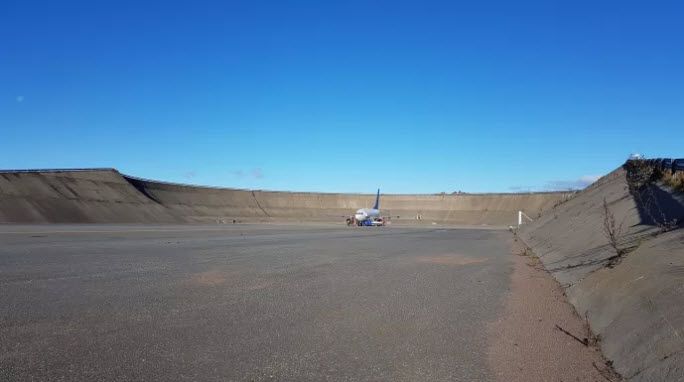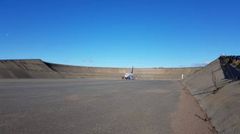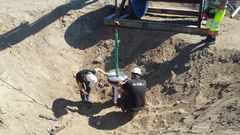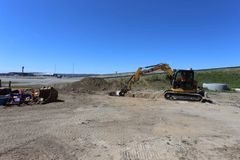Norway’s deepest geothermal borehole under construction at Avinor Oslo Airport

“Groundbreaking Norwegian technology allows us to drill the deepest land-based geothermal borehole in Norway ever. It enables us to use the heat in the ground to heat buildings or other major installations,” says director of airside operations, Henning Bråtebæk.
The engine test site as trial project
In a controlled manner, the concept can send cold water deep underground, whereupon heated water is returned to the surface. This can then be used for heating building, or in the case of this project, to heat the engine test site and keep it clear of snow. Not only is the technology groundbreaking, but never before has a Norwegian land-based geothermal borehole been drilled so deep.
The first in Norway to 1,500 metres
“We’ve drilled to a depth of 1,500 metres for both boreholes, and when the project is completed they should be capable of heating the entire area of the engine test site. This has never before been achieved in Norway,” explains Thor Erik Musæus, general manager of Rock Energy AS, who adds that the extracted energy can be used to heat large buildings:
“The heat extracted from one of these boreholes corresponds to the effect of around one hundred radiators.
Heat from the earth’s interior can provide huge amounts of energy. In fact, geothermal boreholes can provide a hundred times as much energy as hydropower, and it is this technology that Avinor is now exploiting at Oslo Airport. The product is almost indistinguishable from geothermal energy, but the boreholes are drilled significantly deeper and thus provide far more energy. Cold water is led down in pipes and heated by hot rock.
“This saves us using both energy and snowploughs. In time we may also be able to reduce application of chemicals. At the same time, it is part of the work towards a more innovative and sustainable Avinor. We aim to be a driving force in environmental work in the aviation industry, and then we must have the courage to try out innovative solutions,” says Henning Bråtebæk, Director of Airside Operations.
Innovation Norway goes “all in”
Oslo Airport and Rock Energy also have Innovation Norway on board.
“The full impact of the system will not be apparent before next winter, but this is technology and a product we have great faith in,” he says, and is supported by partner Vidar Dramstad, section head with Innovation Norway:
“Encouraging the development of new and eco-friendly environmental technology is one of the main focus areas of Innovation Norway. With world-leading expertise in drilling technology and drilling operations, technology for exploiting deep geothermal energy is considered one of our national competitive advantages. So far this kind of energy utilization has been too expensive and associated with risk, which has meant that it has been difficult to obtain funding and thus also public risk offloading for such projects. This project was deemed to resolve some of the challenges related to exploiting deep geothermal energy, both technologically and financially. Innovation Norway was thus of the opinion that it was important to go ‘all in’ on this project in terms of both development and investment. This way, we want to contribute to developing knowledge and experience, and thus that deep geothermal energy becomes a profitable green energy option. In addition to developing a sustainable Norwegian industry, we want this to go international and contribute to the global green shift,” he says.
Renewable Geothermal Boreholes
Renewable energy from shallow geothermal boreholes, also called geothermal plants, is energy from the top 2-300 metres of the surface.
Renewable energy from deep geothermal boreholes is heat from depths of 1,500-6,000 metres.
The boreholes at Oslo Airport are unique because they are the first geothermal boreholes to be drilled deep into hard Norwegian bedrock.
The temperature in the ground rises by approximately 20-25 degrees for each kilometre drilled.
Renewable energy from deep geothermal boreholes is heat from levels at depths of 1,500-6,000 metres.
Deep geothermal boreholes have lifespans of several generations to come, because the rock doesn’t stop producing heat.
The footprint is minimal, roughly the size of a manhole cover.
The heat from the ground can easily replace other, less eco-friendly energy sources.
Rock Energy AS:www.rockenergy.no
Båsum Boring AS:www.basum.no


Kontakter
Press contact numberPress service for journalists
Travellers are adviced to call our passenger service at +47 915 06 400
Lasse André VangsteinCommunications Advisor / Press Spokesman Media Relations
Tel:+47 918 15 614lasse.andre.vangstein@avinor.noJoachim Westher AndersenHead of Communications
Tel:+47 918 15 614joachim.westher.andersen@avinor.noBilder



Om The Avinor Group
 The Avinor Group
The Avinor GroupDronning Eufemias gate 6
0191 Oslo
+47 67 03 00 00https://avinor.no/en/corporate/about-us/the-avinor-group/about-the-company
Følg pressemeldinger fra The Avinor Group
Registrer deg med din e-postadresse under for å få de nyeste sakene fra The Avinor Group på e-post fortløpende. Du kan melde deg av når som helst.
Siste pressemeldinger fra The Avinor Group
Passengers numbers increased significantly internationally, but decreased domestically in March10.4.2024 12:13:57 CEST | Pressemelding
5 million travelers used Avinor's airports in March. This is an increase of 1 percent compared to March last year. It is the international traffic that is increasing, with a whopping 12 percent. However, domestic traffic declined by 5 percent compared to March last year.
You decide: Which Edvard Munch painting do you want to see when arriving at Oslo Airport?12.3.2024 08:37:49 CET | Press release
For the first time ever, the public will decide which original Edvard Munch painting will be on display at Oslo airport, this summer and autumn.
Passenger figures for February: Strong growth internationally but flat development domestically11.3.2024 12:00:00 CET | Pressemelding
3.5 million travelers used Avinor's airports in February.
Fourth quarter 2023: Reduced revenue due to changing travel patterns.12.2.2024 14:23:28 CET | Press release
“Avinor's main challenge is reduced revenues due to changes in travel patterns after the pandemic. There are far fewer business travelers than before, and Norwegians' domestic travel activity has levelled off. Lower traffic volume, lack of adjustment of airport taxes, as well as reduced revenue per passenger, largely due to reduced duty-free quota, challenge the Avinor model”, says Abraham Foss, CEO of Avinor.
The trend from 2023 continues in January: Growth abroad and flat development domestically9.2.2024 14:00:00 CET | Pressemelding
3.3 million passengers traveled to and from Avinor's airports in January. That is an increase of 2 percent compared to January last year.
I vårt presserom finner du alle våre siste pressemeldinger, kontaktpersoner, bilder, dokumenter og annen relevant informasjon om oss.
Besøk vårt presserom